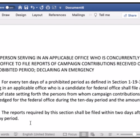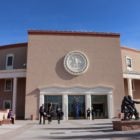2021 Legislative Session
Political spending transparency bill clears Senate
|
The Senate approved a bill Wednesday that would close a “loophole” in the state’s transparency laws, and would require legislators running for federal office to disclose their contributions every 10 days during the legislative session. The loophole allows nonprofit organizations to avoid disclosing donors behind political spending if those giving the money requested in writing that their donations not be spent for political purposes, even if the group decides to use the money for politics anyway. The amended SB 387 ultimately passed the Senate on a 35-3 vote after clearing the Senate Judiciary Committee last Friday, where State Ethics Commission Executive Director Jeremy Farris spoke in favor of the bill. The bill now heads to the House for consideration. “I think it closes the gap,” said Farris, noting that Wirth’s bill was similar to recommendations the commission made in its 2020 annual report.








